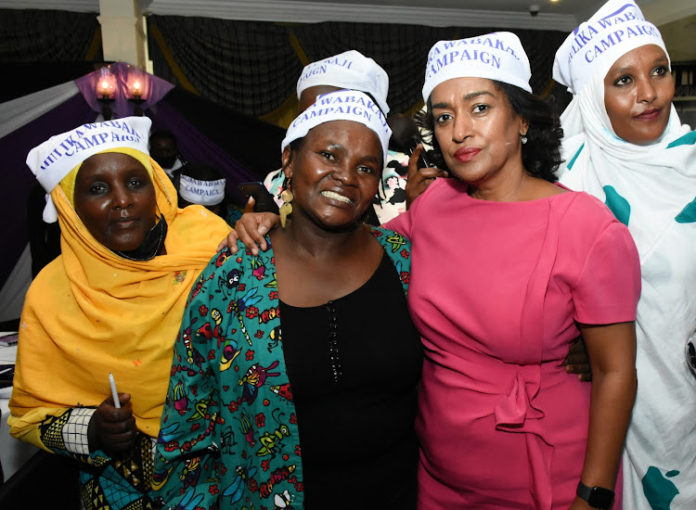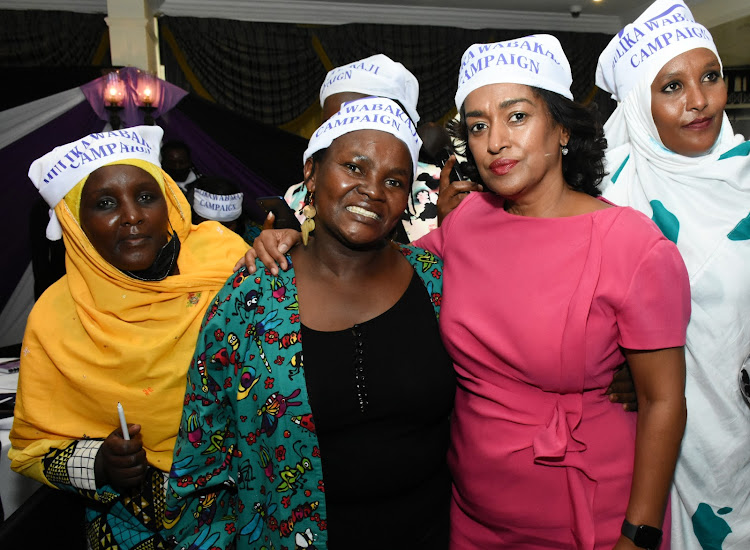
By Henry Owino
Nairobi, Kenya: It is quite common in Kenya to see perpetrators of sexual gender-based violence (SGBV) going scot-free for lack of evidence in the Court of Law or fear of reporting. Mostly if the perpetrator is known to the victim, the case collapses as they often end up threatening to harm victims if they proceed with reporting them.
Most victims end up dropping cases against perpetrators and settling it out of court but the trauma of seeing the perpetrators walk scot-free continues to haunt victims.
To help push for justice, a campaign dubbed Mulika Wabakaji Consortium was launched late last year (December 2021) that is focusing solely on the perpetrators of sexual gender-based violence. The consortium consists of 25-member organizations working to uphold the human rights of women and girls.
The Mulika Wabakaji Campaign brings together different Human Rights Defenders organizations both governmental and non-governmental.
Speaking during the event launch, Njeri Migwi, Executive Director Usikimye noted that the campaign is keen on perpetrators who once found guilty, will be prosecuted and justice must prevail for the victim.
“Most of the time we focus more on the victim and forget about the perpetrators. In this campaign, we are focusing more on the perpetrators to ensure that justice prevails,” Migwi asserted.

Migwi emphasized that the Mulika Wabakaji campaign’s objective is to raise awareness of sexual and gender-based violence, increase accountability for perpetrators of rape and defilement, and shape the public narrative on SGBV.
“We did a research survey, interviewing over 3,005 respondents, and found that the best target for the campaign would be the judiciary while the secondary targets are the police and public prosecutors, local administrators, religious leaders, survivors, and families among others,” Migwi, Executive Director Usikimye disclosed.
She hinted that the team targets to raise awareness in Nairobi and other counties with high prevalence rates of SGBV. Migwi stated the evidence that has been gathered during the research will be used to sensitize the public on the magnitude and impact of rape and defilement.
“I am sure the campaign will increase public awareness, visibility of the issue and reshape public narrative hence increasing demand for accountability on cases of rape and defilement,” Migwi assured the public.
Stakeholders involved
The key stakeholders for the campaign are Civil Society Organizations (CSOs) on SGBV, Donor Community and Development Partners, Community Members, Physicians for Human Rights, Pro-bono Lawyers, and Advocates.
The campaign is slated to run for three years in three phases. During the period, the group will monitor, evaluate and report on its progress towards the overall goal to further develop a plan for the next steps which will incorporate learning the results achieved.
Some of the tactics the team aims to use are capacity building through strengthening the capacity of police officers and prosecutions on prevention of evidence, management, and handling of SGBV cases. Shaping the public narrative through creating awareness and engaging the media.
The team revealed accountability is going to be conducted through continuous research, documenting the SHBV cases to acknowledge the magnitude of the problem, initiate strategic litigation, and monitor, document, and report on SGBV.
Other strategies include visibility through media strategies, generation of facts on SGBV, IEC materials, lobby and advocacy, and networking and collaboration. Resource mobilization through increasing campaign ownership, developing campaign budget, and fundraising for the campaign.
Expected challenges
While shaping the public narrative, the team is expected to create awareness through workshops, public baraza, roadshows among others. The campaign comes at a time when the country is experiencing election campaigns for the upcoming polls scheduled in August 2022.
Often, this may increase incidents of sexual violence especially in violence-prone areas.
Despite the foreseen challenges, Mulika Wabakaji campaign hopes to reduce the SGBV cases, increase survivor reporting, improve responses and referrals mechanisms. Above all, ensure more water-tight evidence, increase trust in the judicial system, reduce SGBV cases and reduce stigmatization or non-discrimination on the basis of nationality, race, religious belief, political views, sexual orientation, social or another status during the entire period.

Safe Houses
Esther Passaris, Nairobi Women Representative promised to establish more safe houses for the victims of SGBV to help protect them from perpetrators’ influence. She said her office is working very closely with the police together with other relevant government agencies to come up with safe houses in Nairobi County.
Passaris blamed the lack of safe houses, forensic laboratories to test specimen, which has contributed largely to the collapse of most the SGBV cases. She explained it is so that perpetrators take advantage of situations to easily access victims and either bribe or threaten them.
To solve such a challenge and ensure action is taken, Passaris disclosed that she has initiated a conversation between Medicines sans Frontiers (MSF) and the Director of Criminal Investigation (DCI) to come up with a forensic laboratory.
“We cannot collect specimen then we don’t know what is happening with the specimen or how to use it for detection,” Passaris said.
She revealed that the lack of such important facilities in the fight against SGBV encourages offenders to repeat the same offense knowing very well he will walk scot-free. This habit must stop forthwith for justice to prevail.
“We are going to have 17 containers in Nairobi County to safe house male, female,

and children victims. Additionally, we are also putting up the first government-run safe houses. This is in partnership with Nairobi Metropolitan and Nairobi County Government injecting Ksh 25 and Ksh 20 million respectively,” Passaris revealed.
Nairobi County Government is also providing land and staff who will be working at the facilities to ensure it is operational.













